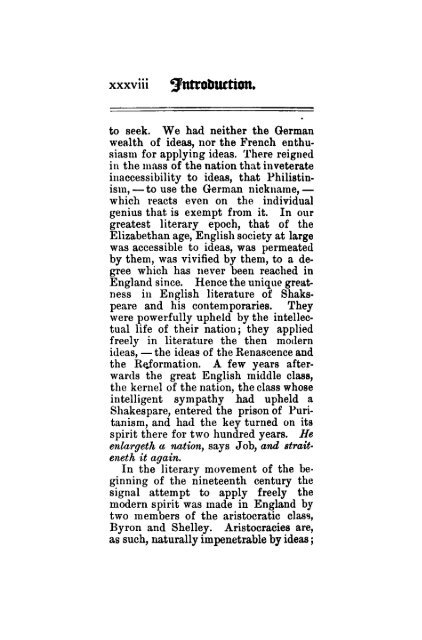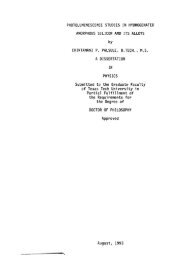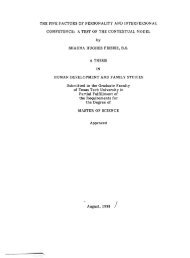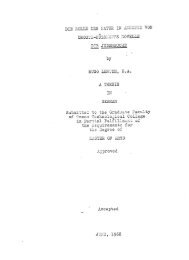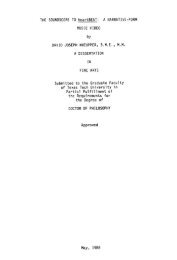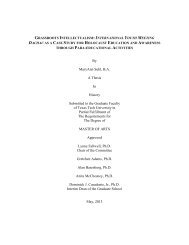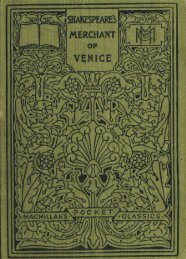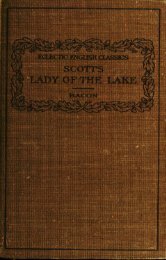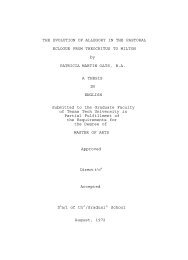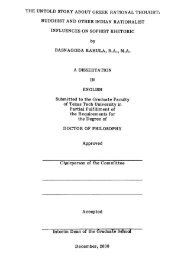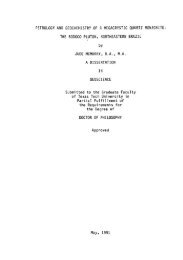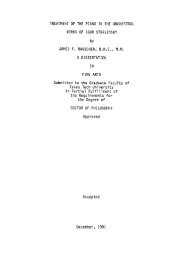- Page 1:
HEINRICH HEINE ^oemd. ^ ^€i/Ka€
- Page 4 and 5:
Copyright 1947, Hartsdalc House, In
- Page 6 and 7:
HOMEWARD BOUNI D SONGS TO SERAPHINE
- Page 9 and 10:
Heinrich Heine Harry Heine, as he w
- Page 11 and 12:
eneadi my dignity and a taint upon
- Page 13 and 14:
a harsh criticism, to much severe c
- Page 15 and 16:
such a man as Heine every career th
- Page 17 and 18:
and the fierce spirit of vindictive
- Page 19 and 20:
tender and constant as it had been
- Page 21 and 22:
named me in healthier days. I am no
- Page 23:
« ^ < 'la^^U ^
- Page 26 and 27:
In fond delusion once I left thy si
- Page 28 and 29:
With casements closed, and everywhe
- Page 30 and 31:
Donna Clara In the evening through
- Page 32 and 33:
Myriad snowy flakes of blossoms She
- Page 34 and 35:
"Hark, they summon me, my darling.
- Page 36 and 37:
"Donna Clara! Laugh, be merry, For
- Page 38 and 39:
Gallant knights and noble ladies. I
- Page 40 and 41:
And the dance begins already, Gaily
- Page 42 and 43:
"In the name of God, begone then!"
- Page 44 and 45:
Tannhauser A Legend Good Christians
- Page 46 and 47:
"Come! to my chamber let us go; Our
- Page 48 and 49:
% In Rome, in Rome, in the holy tow
- Page 50 and 51:
"As the butterfly flutters anigh a
- Page 52 and 53:
"Oh, holy Father, Pope Urban, Who c
- Page 54 and 55:
She gave him broth, she gave him br
- Page 56 and 57:
In the Underworld "O to be a bachel
- Page 58 and 59:
Whilst their grievance each is vent
- Page 60 and 61:
"Closed those shadowy fields are ev
- Page 62 and 63:
Not a harvest dance without her. Sh
- Page 64 and 65:
The Vale of Tears The night wind th
- Page 66 and 67:
Solomon Dumb are the trumpets, cymb
- Page 68 and 69:
Song Oft in galleries of art Thou h
- Page 70 and 71:
"Oh, I will kiss them, Henry, Kiss
- Page 72 and 73:
ong Death comes, and now must I mak
- Page 74 and 75:
To Frederika Varnhagen von Ense, Th
- Page 76 and 77:
I know not what spell is o'er me, T
- Page 78 and 79:
My heart, my heart is heavy, Though
- Page 80 and 81:
In tears through the woods I wander
- Page 82 and 83:
The beautiful spinner weepeth, And
- Page 84 and 85:
And I lisped congratulations. And b
- Page 86 and 87:
We spake of storm and shipwreck. Th
- Page 88 and 89:
The moon is up, and brightly Beams
- Page 90 and 91:
II All in gray clouds closely muffl
- Page 92 and 93:
»3 The storm for a dance is piping
- Page 94 and 95:
Paler, the moon is growing Through
- Page 96 and 97:
i6 The sea outspreading glorious. I
- Page 98 and 99:
:8 Upon the far horizon Like a pict
- Page 100 and 101:
20 I tread the dear familiar path.
- Page 102 and 103:
22 The quiet night broods over roof
- Page 104 and 105:
The maiden sleeps in her chamber, W
- Page 106 and 107:
25 I gazed upon her portrait. While
- Page 108 and 109:
The years are coming and going. Who
- Page 110 and 111:
*9 What means this lonely tear-drop
- Page 112 and 113:
Then yawns the eldest daughter, "I
- Page 114 and 115:
3^ They think my heart is breaking.
- Page 116 and 117:
34 "Did she ne'er express compassio
- Page 118 and 119:
36 And when I lamented my cruel lot
- Page 120 and 121:
His favorite poet is still Fouque;
- Page 122 and 123:
39 Three holy kings from the land o
- Page 124 and 125:
After her health we inquired Gravel
- Page 126 and 127:
42 As the moon with splendor pierce
- Page 128 and 129:
43 In a dream I saw my sweetheart,
- Page 130 and 131:
44 "Dearest friend, what may it pro
- Page 132 and 133:
46 ime that, more sober and serious
- Page 134 and 135:
48 Heart, my heart, oh, be not shak
- Page 136 and 137:
5° Child, I must be very careful.
- Page 138 and 139:
5* Maiden with the lips of scarlet,
- Page 140 and 141:
54 Some to Mary bend the knee, Othe
- Page 142 and 143:
56 Dearest friend, thou art in love
- Page 144 and 145:
58 Sapphires are those eyes of thin
- Page 146 and 147:
6o Our life and the world have too
- Page 148 and 149:
62 To-night they give a party, The
- Page 150 and 151:
64 Thou hast diamonds, and pearls a
- Page 152 and 153:
(£ They gave me advice, they couns
- Page 154 and 155:
How delightfully refreshing Now-a-d
- Page 156 and 157:
"Within the college seek him not. B
- Page 158 and 159:
The poets are in ecstasies At such
- Page 160 and 161:
70 Oh, to be chased from lovely lip
- Page 162 and 163:
72 Lord knows where the reckless cr
- Page 164 and 165:
"And if a lonely lover Who sings of
- Page 166 and 167:
75 Upon thy snow-white shoulders I
- Page 168 and 169:
11 I, too, in my youth did languish
- Page 170 and 171:
79 Yes, they are the self-same eyes
- Page 172 and 173:
8i But the eunuchs still complained
- Page 174 and 175:
83 Next to me lives Don Henriquez,
- Page 176 and 177:
85 Lo, on the mountains the sunbeam
- Page 178 and 179:
8? Dusky summer-eve declineth Over
- Page 180 and 181:
89 Death is like the balmy night. L
- Page 183:
e W'
- Page 186 and 187:
Over all the quiet sea-shore Shadow
- Page 188 and 189:
In moonlit splendor rests the sea.
- Page 190 and 191:
How enviously the sea-mew Looks aft
- Page 192 and 193:
There we two sat as high as heaven.
- Page 194 and 195:
Gray night broods above the ocean.
- Page 196 and 197:
lO Shadow-love and shadow-kisses. L
- Page 198 and 199:
12 My ship sails forth with sable s
- Page 200 and 201:
H The roaring waves press onward To
- Page 202 and 203:
The waves gleam in the sunshine. Th
- Page 204 and 205:
Though thou wert fain to pass me qu
- Page 206 and 207:
From the slightest of emotions, Wha
- Page 208 and 209:
I closed my sweetheart's either eye
- Page 210 and 211:
8 Whilst I, after other people's. O
- Page 212 and 213:
lO This mad carnival of loving, Thi
- Page 214 and 215:
Spring Festival This is the spring-
- Page 216 and 217:
The Asra Daily the fair Sultan's da
- Page 218 and 219:
ong There stands a lonely pine-tree
- Page 220 and 221:
To Frederick Merckel The Pictures o
- Page 222 and 223:
And as a coronation mantle, I hang
- Page 224 and 225:
J Sunset The glowing red sun descen
- Page 226 and 227:
And in her anguish fain would call
- Page 228 and 229:
Where his feet fall Sparks are scat
- Page 230 and 231:
^ Poseidon The sunbeams played Upon
- Page 232 and 233:
Thus exclaimed Poseidon, And plunge
- Page 234 and 235:
And with a mighty hand, from the No
- Page 236 and 237:
Yonder myriad stars the eyes are Of
- Page 238 and 239:
Thine arm is short and the sky is f
- Page 240 and 241:
O sea. Thou mother of beauty, of th
- Page 242 and 243:
Cal m Calm at sea! The sunbeams fli
- Page 244 and 245:
lo An Apparition in the Sea I howev
- Page 246 and 247:
And I know thee, thou poor, forsake
- Page 248 and 249:
12 Peace High in heaven stood the s
- Page 250 and 251:
Of thy lofty protectress. And haste
- Page 252 and 253:
All hail to thee, thou Eternal Sea!
- Page 254 and 255:
And from the fair barbarians of the
- Page 256 and 257:
The trembling soul of the ship; And
- Page 258 and 259:
Her slender, cypress-like form Is s
- Page 260 and 261:
Universally beloved, universally ad
- Page 262 and 263:
5 The Song of the Oceanides 'Tis ni
- Page 264 and 265:
Loud roared the billows. And deep f
- Page 266 and 267:
6 The Gods of Greece Full-blooming
- Page 268 and 269:
Thou seemest to me a goddess-corpse
- Page 270 and 271:
7 The Phoenix A bird comes flying o
- Page 272 and 273:
8 Question By the sea, by the desol
- Page 274 and 275:
Meanwhile the ship wrestles With th
- Page 276 and 277:
lo In Port Happy the man who has re
- Page 278 and 279: Decked with gold and arrayed in pur
- Page 283: HEINE.
- Page 287 and 288: Edited by NEWELL DUNBAR HEINRICH HE
- Page 289 and 290: EDITOR'S PREFACE. THE reading publi
- Page 291: ^Un^tvation^. PAGE HEINE IN 1827 .
- Page 294 and 295: Vlll €ontattie?* \'RTOR III GO TH
- Page 296 and 297: €ontentier* THE POWER OI- WOMEN .
- Page 298 and 299: xn Contrntief. PERFECT HAPPINESS TH
- Page 300 and 301: XIV 4rontentie(* THE POET'S IMPARTI
- Page 302 and 303: The spirit of the woild Belioklinf^
- Page 304 and 305: xvi S^ntrotiuction, in discharging
- Page 306 and 307: xviii ^Tntrotiuction, Avhich of Goe
- Page 308 and 309: XX SFntrobuctioit, task of dissolut
- Page 310 and 311: xxii 5ntrot»uction» whose revolut
- Page 313 and 314: ^'ntrotmttton. xxlii Efforts have b
- Page 315 and 316: 3Pntrotiuction, xxv cause it was pr
- Page 317 and 318: S'nttOtniCttOtU xxvii and he shows
- Page 319 and 320: S^ntroliuction* xxix and courtiers
- Page 321 and 322: ^Tntrotiuction. xxxi "' Am I then r
- Page 323 and 324: ^Fntrotjuctiom xxxiii went on compo
- Page 325 and 326: Itootmtttott. XXXV his subject-matt
- Page 327: STntroductton. xxxvli mon school-bo
- Page 331 and 332: ^Fntrotiuctton, xll France Heine jo
- Page 333 and 334: ^Fntroliuction. xliil people of gen
- Page 335 and 336: 3FntroDuction» xlv reward, as alwa
- Page 337 and 338: 3^ntrotmctiom xlvii they crouched i
- Page 339 and 340: 3^ntrotiuction» xllx and politely
- Page 341 and 342: ^Fntrotiuction* whom he conquers th
- Page 343 and 344: ^Fntrobuction* liii all the scatter
- Page 345 and 346: S^ntroDuction, Iv entertaining hers
- Page 347 and 348: 3Fntrotiu(tion« Ivii (and posterit
- Page 349: WIT, WISDOM, POETRY.
- Page 352 and 353: ^eine* none is so trusty as the tru
- Page 354 and 355: I^eine* That I might love embrace r
- Page 356 and 357: I^eine, thoughts, with which the sp
- Page 358 and 359: 8 ^eim. PHILOSOPHY AND REVOLUTION.
- Page 360 and 361: lo ijeine. which indeed is almost i
- Page 362 and 363: 12 ^tine. though the learning of it
- Page 364 and 365: 14 i$tmt. I always told thee I shou
- Page 366 and 367: 16 f^tint. THE COMING FRAY. The mus
- Page 368 and 369: 18 i^eine* VICTOR HUGO. Victor Hugo
- Page 370 and 371: 20 i^cine. Who twines in one wreath
- Page 372 and 373: 22 i$tmt. Plucks from His head the
- Page 374 and 375: 24 J^eine, SHAKESPEARE. Generous Na
- Page 376 and 377: 26 i^etne. CHRIST. Christ is the Go
- Page 378 and 379:
28 l^etne* THE DELIGHT OF LIVING. L
- Page 380 and 381:
30 f^tint. After her health we aske
- Page 382 and 383:
32 ^tint. in these sat the damned,
- Page 384 and 385:
34 "l^tmt. ENGLAND S UPPER TEN. Yes
- Page 386 and 387:
36 i^eine. That outpost is abandone
- Page 389 and 390:
i^eine* zi JEWISH RELIGION AND RACE
- Page 391 and 392:
^dnt. 39 like a great German tom-ca
- Page 393 and 394:
Jpeine, 41 til they have a beard, a
- Page 395 and 396:
i^eme* 43 He sees na the black rock
- Page 397 and 398:
^tint. 45 When I see the amorous fl
- Page 399 and 400:
I^etne* 47 Grete and Hans were wed
- Page 401 and 402:
i^eine, 49 THE EASTERN QUESTION. Th
- Page 403 and 404:
^tmt. 51 MARTIN LUTHER. How shall I
- Page 405 and 406:
ipeine. 53 wine is always exquisite
- Page 407 and 408:
J^eme^ 55 FRENCH POLITENESS. Sweet
- Page 409 and 410:
^me, s7 MEN OF THOUGHT AND MEN OF A
- Page 411 and 412:
^tmt. 59 '• When frosts set in,"
- Page 413 and 414:
I^etne* 6\ SUPREMACY OF LOVE. Now,
- Page 415 and 416:
I^eine* 63 BIMIXI. Who's with me fo
- Page 417 and 418:
^tint. 65 of cmel tenderness, she k
- Page 419 and 420:
1$tm. 67 GERMAN PHILOSOPHY. German
- Page 421 and 422:
J^eine, 69 He speaks the exorcism d
- Page 423 and 424:
a^dnt. 71 A RESURRECTION DREAM. Nig
- Page 425 and 426:
i^eine, TZ LONGEVITY OF GERMAN POTE
- Page 427 and 428:
1$eim. 75 GREAT MEN. As the stars a
- Page 429:
MATHILDE HEINE.
- Page 432 and 433:
78 i$tmt. IN THE HARBOR. Happy is h
- Page 434 and 435:
8o J^eine, TEMPTATION Cleopatra is
- Page 436 and 437:
82 J^ehtf, HEINE AND ROMAN CATHOLIC
- Page 438 and 439:
$4 i^etne. POETIC THRIFT. "Worthy f
- Page 440 and 441:
86 ^eint. . TAKE HEART. Heart, my h
- Page 442 and 443:
88 l^eine.
- Page 444 and 445:
90 I^eine* THE FUTURE. The future s
- Page 446 and 447:
92 J^eine* SWEET DELUSION. Ah, what
- Page 448 and 449:
94 l^eme. A MEETING. All under the
- Page 450 and 451:
96 i^eine* MYSTERY OF THE JEWS. The
- Page 452 and 453:
98 ^dnt. BRITISH MISSIONS. They exp
- Page 454 and 455:
loo i^eine» THE POETS HEART. The B
- Page 456 and 457:
I02 i$tim. THE FAIRIES. The waves t
- Page 458 and 459:
I04 J^eme* PROTESTANTISM. At an ear
- Page 460 and 461:
io6 i^eine. OCCIDENTAL ORIENTALIZAT
- Page 462 and 463:
io8 i^eim. THE MINOR UNDERTONE. The
- Page 464 and 465:
no ^tint. THE POET'S IMPARTIALITY.
- Page 466 and 467:
112 1$dm. SCHILLER. The living spir
- Page 468 and 469:
114 l^eine* FRENCH AND GERMAN PATRI
- Page 470 and 471:
ii6 i^etne* A SUPPLICATION, A star
- Page 472 and 473:
ii8 ^eine* SHEPHERD AND LAMB. 0 lit
- Page 474:
120 J^eme* QUESTIONS. Beside the se
- Page 479 and 480:
i^eine* 121 CHIVALRY, — that herm
- Page 481:
^dnt. 123 booth closed where ye use
- Page 485 and 486:
THE ENGLISH LEGEND of HEINRICH HEIN
- Page 487 and 488:
THE ENGLISH LEGEND oj HEINRICH HEIN
- Page 489:
TO MAURICE JACOBS
- Page 493:
PREFACE THE life of Heinrich Heine,
- Page 497 and 498:
INTRODUCTION FOR a century and more
- Page 499:
Introduction pre-Victorian days to
- Page 502 and 503:
Heinrich Heine by a formal acknowle
- Page 504 and 505:
Heinrich Heine his relationship to
- Page 506 and 507:
Heinrich Heine sired to understand
- Page 508 and 509:
Heinrich Heine sider the subject fu
- Page 510 and 511:
Heinrich Heine crawling reptile —
- Page 512 and 513:
Heinrich Heine their erstwhile coll
- Page 514 and 515:
Heinrich Heine his imagination, his
- Page 516 and 517:
Heinrich Heine man, and every man's
- Page 518 and 519:
Heinrich Heine relations of all his
- Page 520 and 521:
Heinrich Heine traitor and renegade
- Page 522 and 523:
Heinrich Heine author of the Book o
- Page 524 and 525:
Heinrich Heine tude towards Germany
- Page 526 and 527:
CHAPTER II MARTYR OF MONTMARTRE THE
- Page 528 and 529:
Heinrich Heine parties of Germany,
- Page 530 and 531:
Heinrich Heine Duke of WeUington. M
- Page 532 and 533:
Heinrich Heine tion turned about po
- Page 534 and 535:
Heinrich Heine teenth birthday he w
- Page 536 and 537:
Heinrich Heine ficial duties were n
- Page 538 and 539:
Heinrich Heine ness of diction and
- Page 540 and 541:
Heinrich Heine who was dying in an
- Page 542 and 543:
Heinrich Heine land. He confessed:
- Page 544 and 545:
Heinrich Heine average educated Eng
- Page 546 and 547:
Heinrich Heine that the early hosti
- Page 548 and 549:
Heinrich Heine in Clavigo, and we c
- Page 550 and 551:
Heinrich Heine though o'erthrown is
- Page 552 and 553:
Heinrich Heine impose their legend
- Page 554 and 555:
Heinrich Heine ligned poet. Further
- Page 556 and 557:
Heinrich Heine smile on human tears
- Page 558 and 559:
Heinrich Heine ties, his failings c
- Page 560 and 561:
Heinrich Heine through five edition
- Page 562 and 563:
Heinrich Heine that helped him to f
- Page 564 and 565:
Heinrich Heine the most famous of t
- Page 566 and 567:
Heinrich Heine Dante, radiant Shake
- Page 568 and 569:
Heinrich Heine Deep have embreathed
- Page 570 and 571:
Heinrich Heine and continuator of t
- Page 572 and 573:
Heinrich Heine there was in all Hei
- Page 574 and 575:
Heinrich Heine mately alhed with su
- Page 576 and 577:
CHAPTER IV HELLENIST AND CULTURAL P
- Page 578 and 579:
Heinrich Heine the Hellenism of Hei
- Page 580 and 581:
Heiruich Heine wines, if I myself,
- Page 582 and 583:
Heinrich Heine offered as a substit
- Page 584 and 585:
Heinrich Heine And groweth wan and
- Page 586 and 587:
Heinrich Heine while doing justice
- Page 588 and 589:
Heinrich Heine him, as it had been
- Page 590 and 591:
Heinrich Heine fore it, seeing that
- Page 592 and 593:
Heinrich Heine intense and luminous
- Page 594 and 595:
Heinrich Heine The nostalgia of the
- Page 596 and 597:
Heinrich Heine tion of his Hebraic
- Page 598 and 599:
Heinrich Heine lish co-religionists
- Page 600 and 601:
Heinrich Heine 1841, was Heine used
- Page 602 and 603:
Heinrich Heine very tempest \\hich
- Page 604 and 605:
Heinrich Heine character for that r
- Page 606 and 607:
Heinrich Heine and paid but httle a
- Page 608 and 609:
Heinrich Heine people by turns, the
- Page 610 and 611:
Heinrich Heine strange mixture of r
- Page 612 and 613:
Heinrich Heine 1884 concerning her
- Page 614 and 615:
Heinrich Heine ZangwiU's essay had
- Page 616 and 617:
Heinrich Heine then it was not surp
- Page 618 and 619:
Heinrich Heine ments was Jewish hat
- Page 620 and 621:
Heinrich Heine roots was indeed mor
- Page 622 and 623:
Heinrich Heine by Lord Houghton and
- Page 624 and 625:
Heinrich Heine this book, Ellis fou
- Page 626 and 627:
Heinrich Heine view of September, 1
- Page 628 and 629:
Heinrich Heine racial hatreds as a
- Page 630 and 631:
Heinrich Heine eve of the First Wor
- Page 632 and 633:
Heinrich Heine 8, 1888, wrote that
- Page 634 and 635:
Heinrich Heine upon the imagination
- Page 636 and 637:
Heinrich Heine Were all you had, pa
- Page 638 and 639:
Heinrich Heine gems of the Book of
- Page 640 and 641:
Heinrich Heine is Wordsworth's,' I
- Page 642 and 643:
Heinrich Heine under the pseudonym
- Page 644 and 645:
Heinrich Heine poetry, preferred to
- Page 646 and 647:
Heinrich Heine sure I had done one
- Page 648 and 649:
Heinrich Heine of a Teutonic return
- Page 650 and 651:
Heinrich Heine mently was the offic
- Page 652 and 653:
Heinrich Heine \\'as an affectation
- Page 654 and 655:
Heinrich Heine where the nightingal
- Page 656 and 657:
Heinrich Heine ter, and godlessness
- Page 658 and 659:
CHAPTER VII CITIZEN OF THE WORLD WH
- Page 660 and 661:
Heinrich Heine man poets. Little wo
- Page 662 and 663:
Heinrich Heine In contrast to the C
- Page 664 and 665:
Heinrich Heine planation in the fac
- Page 666 and 667:
Heinrich Heine he did not like the
- Page 668 and 669:
Heinrich Heine vantage-point at the
- Page 670 and 671:
Heinrich Heine f eited with nariona
- Page 672 and 673:
Heinrich Heine dom that was most es
- Page 674 and 675:
Heinrich Heine 3. Athenaeum, Februa
- Page 676 and 677:
Heinrich Heine 9. Saturday Review,
- Page 678 and 679:
Heinrich Heine 6. Robert Buchanan:
- Page 680 and 681:
Heinrich Heine 19. Henry Baeriein:
- Page 682 and 683:
Index Comte, Auguste, 87 Contempora
- Page 684 and 685:
Monthly Observer, 40 Morawski, Theo


